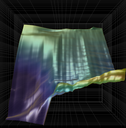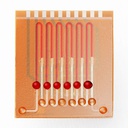
TF uncovered – Part 4

TF uncovered – Part 4

Ultra-smooth interactions can be detected through high-speed measurement and frequency analysis

TF uncovered – Part 3

TF uncovered - Part 2

TF uncovered - Part 1

Panel discussion “Neurotechnology, Ethics and Acceptance”

The Disposable Microsystems group is excited to announce its latest publication, a Personal View article, entitled “A three-level model for therapeutic drug monitoring of antimicrobials at the site of infection” in Lancet Infectious Diseases.

Prof. Dr. Alwin Daus will investigate novel thin-film materials and create sensors, transistors, and memory devices for flexible electronics, 3D integrated circuits, and neuromorphic computing.

Experience business and science at POP UP INNOVATION STORE

University of Freiburg and MIT conduct research on SnO2/ZnO core/shell nanowires

An interactive festival featuring data, tamers and artificial intelligence

Researchers of the Project nEOdiag aims to develop fast and inexpensive analyses of amino acid sequences at the University of Freiburg

Engineer Edoardo Milana will research bioinspired soft robotic systems made of deformable and adaptive materials at the University of Freiburg

Sebastian Stöcklin receives award for his doctoral thesis in the field of wireless power and data transfer

April 2023: Samora Okujeni and Ulrich Egert published a new article in the Journal of Neuroscience, entitled: “Structural modularity tunes mesoscale criticality in biological neuronal networks”

April 2023: Artwork relating to Samora Okujeni’s current article was chosen as cover image for the Journal of Neuroscience 43(14).

Mark Schepperle receives the "Best Paper Award" at the MHMT'23 Conference in Lisbon

The cluster nanodiag BW starts its first implementation phase with four funded projects

Inaugural lecture of Prof. Kuhl on 31.03.2023: Latest applications and technologies in medicine and industry

28/03/2023. Martin Ladecký was awarded the Dr. Klaus Körper Prize of the Association of Applied Mathematics and Mechanics (GAMM) for his dissertation.

DFG grant funding a new research project in in computational and experimental neuroscience.

In the System Design Project, our students inspire with great robots

Here is the link to the livestream of tomorrow's System Design Project 2023

Jan 27, 2023. A team around Prof. Alexander Rohrbach (IMTEK) analyzes how model bacteria dock to and penetrate membrane bubbles: Thermal motions and oscillation modes determine the uptake of bacteria in cells.

Self-built robots by students will compete against each other on 14 February 2023

Jan 18, 2023. A total of 11 seminars with lecture series in the summer semester 2023.

Merry Christmas and a Happy New Year 2023!

Dec 07, 2022. Funding approval from the Invest BW programme for miniaturised intelligent neuro stimulation system

Christmas Lecture at the Faculty of Engineering December 8, 2022

Research team from Freiburg led by microsystems engineer Dr. Can Dincer introduces a biosensor for the nucleic acid amplification-free detection of SARS-CoV-2 RNA
Document Actions